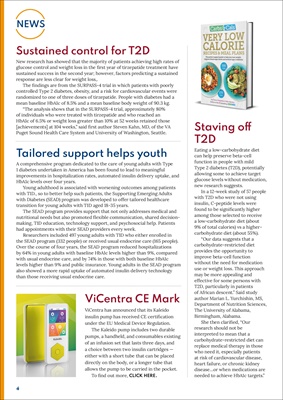
4
NEWS
Sustained control for T2D
New research has showed that the majority of patients achieving high rates of
glucose control and weight loss in the first year of tirzepatide treatment have
sustained success in the second year; however, factors predicting a sustained
response are less clear for weight loss,.
The findings are from the SURPASS-4 trial in which patients with poorly
controlled Type 2 diabetes, obesity, and a risk for cardiovascular events were
randomized to one of three doses of tirzepatide. People with diabetes had a
mean baseline HbA1c of 8.5% and a mean baseline body weight of 90.3 kg.
"The analysis shows that in the SURPASS-4 trial, approximately 80%
of individuals who were treated with tirzepatide and who reached an
HbA1c of 6.5% or weight loss greater than 10% at 52 weeks retained those
[achievements] at 104 weeks," said first author Steven Kahn, MD, of the VA
Puget Sound Health Care System and University of Washington, Seattle.
Tailored support helps youth
A comprehensive program dedicated to the care of young adults with Type
1 diabetes undertaken in America has been found to lead to meaningful
improvements in hospitalization rates, automated insulin delivery uptake, and
HbA1c levels over four years.
Young adulthood is associated with worsening outcomes among patients
with T1D., so to better help such patients, the Supporting Emerging Adults
with Diabetes (SEAD) program was developed to offer tailored healthcare
transition for young adults with T1D aged 18-35 years.
The SEAD program provides support that not only addresses medical and
nutritional needs but also promoted flexible communication, shared decisionmaking, T1D education,
technology support, and psychosocial help. Patients
had appointments with their SEAD providers every week.
Researchers included 497 young adults with T1D who either enrolled in
the SEAD program (332 people) or received usual endocrine care (165 people).
Over the course of four years, the SEAD program reduced hospitalizations
by 64% in young adults with baseline HbA1c levels higher than 9%, compared
with usual endocrine care, and by 74% in those with both baseline HbA1c
levels higher than 9% and public insurance. Young adults in the SEAD program
also showed a more rapid uptake of automated insulin delivery technology
than those receiving usual endocrine care.
Staving off
T2D
Eating a low-carbohydrate diet
can help preserve beta-cell
function in people with mild
Type 2 diabetes (T2D), potentially
allowing some to achieve target
glucose levels without medication,
new research suggests.
In a 12-week study of 57 people
with T2D who were not using
insulin, C-peptide levels were
found to be significantly higher
among those selected to receive
a low-carbohydrate diet (about
9% of total calories) vs a highercarbohydrate
diet (about 55%).
"Our data suggests that a
carbohydrate-restricted diet
provides the opportunity to
improve beta-cell function
without the need for medication
use or weight loss. This approach
may be more appealing and
effective for some persons with
T2D, particularly in patients
of African descent." Said study
author Marian L. Yurchishin, MS,
Department of Nutrition Sciences,
The University of Alabama,
Birmingham, Alabama.
She then clarified, "Our
research should not be
interpreted to mean that a
carbohydrate-restricted diet can
replace medical therapy in those
who need it, especially patients
at risk of cardiovascular disease,
heart failure, or chronic kidney
disease…or when medications are
needed to achieve HbA1c targets."
ViCentra CE Mark
ViCentra has announced that its Kaleido
insulin pump has received CE certification
under the EU Medical Device Regulation.
The Kaleido pump includes two durable
pumps, a handheld, and consumables existing
of an infusion set that lasts three days, and
a choice between two insulin cartridges -
either with a short tube that can be placed
directly on the body, or a longer tube that
allows the pump to be carried in the pocket.
To find out more, CLICK HERE.